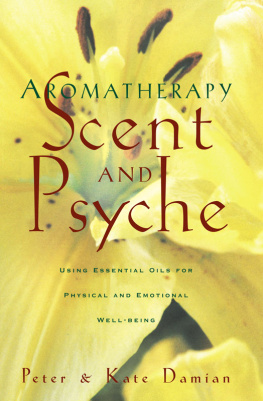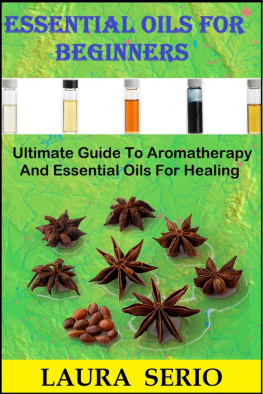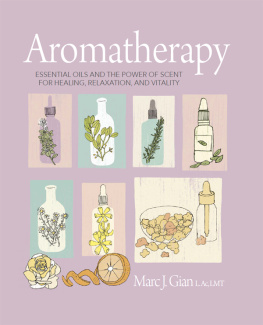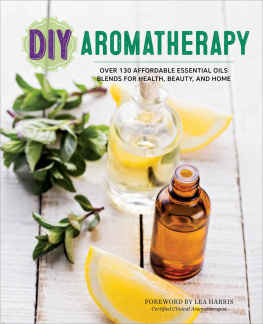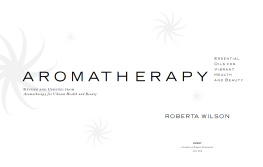AROMATHERAPY
Essential Oils
for Healing

Demetria Clark


2015 Demetria Clark
All rights reserved. No portion of this book may be reproduced by any means whatsoever, except for brief quotations in reviews, without written permission from the publisher.
Cover and interior design: Scattaregia Design
Healthy Living Publications,
a division of Book Publishing Company
PO Box 99
Summertown, TN 38483
888-260-8458
bookpubco.com
ISBN 978-1-57067-322-1
20 19 18 17 16 15 1 2 3 4 5 6 7 8 9
Library of Congress Cataloging-in-Publication Data
Clark, Demetria.
Aromatherapy essential oils for healing / Demetria Clark.
pages cm
ISBN 978-1-57067-322-1 (pbk.) -- ISBN 978-1-57067-872-1 (e-book)
1. Aromatherapy. I. Title.
RM666.A68C53 2015
615.3219--dc23
2014049751
Printed on recycled paper
Book Publishing Company is a member of Green Press Initiative. We chose to print this title on paper with 100% post-consumer recycled content, processed without chlorine, which saved the following natural resources:

| 18 trees 563 pounds of solid waste 8,414 gallons of water 1,551 pounds of greenhouse gases 8 million BTUs of energy | 
|
For more information on Green Press Initiative, visit greenpressinitiative.org . Environmental impact estimates were made using the Environmental Defense Fund Paper Calculator. For more information, visit papercalculator.org .
CONTENTS
Aromatherapy for Body, Mind, and Spirit
Aromatherapy, simply defined, is the process of using scents for healing. Its a very easy and practical everyday therapy to use at home; in fact, many types of aromatherapy applications can be made at home (see ). Topical applications, which are applied directly to the skin, include body sprays, creams, compresses, liniments, and massage oils. Alternatively, scents can be diffused into the surrounding air or dispersed through steam and inhaled.
Aromatherapy has many uses and multiple potential benefits. Its effective cosmetically, for skin and hair care, or it can be used to target deeper issues, such as specific physical, emotional, and mental health concerns.
Aromatherapy works because the system involved in the sense of smell, the olfactory system, connects the nose with points in the brain that comprise the limbic system. Here lies the amygdala, hippocampus, and hypothalamus, parts of the brain that are concerned primarily with emotion and motivation. When stimulated by smell, the limbic system releases chemicals that affect the central nervous system, influencing physical, emotional, and mental health.
From our own individual experiences, we know that anything we smell in our natural environment can stimulate sometimes strong reactions. The powerful sense of smell can evoke attachments, feelings, and memories. For example, scent attracts people to potential mates and promotes a bond between a new baby and its parents. In fact, whether were aware of it or not, the sense of smell activates our most primal emotions, including fear, love, and lust.
Each brain processes scent differently. For example, the scent of lavender typically makes people feel relaxed and at ease. However, for some people, lavender may smell unpleasant, or it may cause them to feel agitated or restless. Its important for anyone who uses aromatherapy, from a professional aromatherapist to someone who occasionally uses a diffuser at home, to be aware that scents dont elicit the same reactions in every aromatherapy user.
A Short History of Modern Aromatherapy
The term aromatherapy was coined in 1928 by chemist Ren-Maurice Gattefoss, who was inspired to study and write about essential oils after an explosion in his lab. His hand was badly burned, and he treated his wounds with lavender essential oil. When his burns healed remarkably quickly, he was inspired to investigate essential oils further.
Influenced by the work of Gattefoss, French physician Jean Valnet used essential oils as antiseptics while treating wounded soldiers during World War II. He continued his use and scientific study of essential oils, eventually publishing his classic text, Larmathrapy, in France in 1964. The English version, The Practice of Aromatherapy, is still available. Valnets approach of matching the healing properties of a specific plant with the needs of the patient remains the backbone of modern aromatherapy. His work has inspired many well-known aromatherapists, including Micheline Arcier, Julia Lawless, Marguerite Mary, Shirley Price, and Robert Tisserand, and me.
Essential Oils
The scents used in aromatherapy are typically essential oils, or concentrated plant oils. Despite the name, essential oils are not all that oily because theyre not true oils but rather the essence of plant components. Essential oils are found in the flowers, fruits, leaves, roots, seeds, and stems of plants. Most are clear, but some are amber, brown, orange, or yellow, depending on the color of the plant source.
There are different ways to extract an essential oil from a plant. The most common method is water distillation. Other essential oils are expressed, and some are extracted using ancient techniques. Following are some common extraction methods:
Distillation. The most popular method of obtaining essential oils is through steam distillation. Anyone who is familiar with how an old-fashioned moonshine still works knows the basics of distillation: water is heated to the boiling point, then the resulting steam passes through fresh plant material that has been placed above the boiling water. The steam pressure is carefully controlled. When the steam passes through the plant material, it causes the plants cell walls to swell and break down. This allows the essential oil to be released as vapor. Then the essential oil vapor and water pass through a condenser that cools the steam and the oil into a liquid. Because essential oils dont dissolve in water, the two can be separated. Essential oils that are lighter than water rise to the top and are then siphoned off. Essential oils that are heavier than water sink to the bottom and can be collected.
Enfleurage. An ancient technique for extracting essential oils is enfleurage, which involves the application of odorless fats and oils to plants to absorb the plants essential scent qualities. In the past, this process was typically used to extract the essential oils of highly scented, fatty flowers, such as honeysuckle and jasmine. This method is not commonly used in the making of modern essential oils.
Expression. Expression is a method that physically forces the essential oil from a plant. For example, components of a citrus plant may be pressed to obtain the essential oil. You can witness an example of expression simply by peeling an orange. When you bend the rind, the oranges essential oil sprays forth, creating a visible display (if you look closely) and coating your fingers with an enticing scent. Expression is also known as cold-pressing, and the resulting oils may be referred to as cold-pressed extractions.


